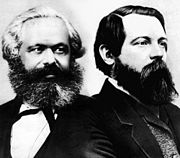
Commodity (Marxism)

In classical political economy and especially Karl Marx's critique of political economy, a commodity is any good or service ('products' or 'activities') produced by human labour and offered as a product for general sale on the market. Some other priced goods are also treated as commodities, e.g. human labor-power, works of art and natural resources, even though they may not be produced specifically for the market, or be non-reproducible goods.Man really attains the state of complete humanity when he produces, without being forced by physical need to sell himself as a commodity. In classical political economy and especially Karl Marx's critique of political economy, a commodity is any good or service ('products' or 'activities') produced by human labour and offered as a product for general sale on the market. Some other priced goods are also treated as commodities, e.g. human labor-power, works of art and natural resources, even though they may not be produced specifically for the market, or be non-reproducible goods. Marx's analysis of the commodity is intended to help solve the problem of what establishes the economic value of goods, using the labor theory of value. This problem was extensively debated by Adam Smith, David Ricardo, and Karl Rodbertus-Jagetzow, among others. Value and price are not equivalent terms in economics, and theorising the specific relationship of value to market price has been a challenge for both liberal and Marxist economists. In Marx's theory, a commodity is something that is bought and sold, or exchanged in a market. Price is then the monetary expression of exchange-value, but exchange value could also be expressed as a direct trading ratio between two commodities without using money, and goods could be priced using different valuations or criteria. According to the labor theory of value, product-values in an open market are regulated by the average socially necessary labour time required to produce them, and price relativities of products are ultimately governed by the law of value. Commodity-trade, Marx argues, historically begins at the boundaries of separate economic communities based otherwise on a non-commercial form of production. Thus, producers trade in those goods of which those producers, have episodic or permanent surpluses to their own requirements, and they aim to obtain different goods with an equal value in return. Marx refers to this as 'simple exchange' which implies what Frederick Engels calls 'simple commodity production'. At first, goods may not even be intentionally produced for the explicit purpose of exchanging them, but as a regular market for goods develops and a cash economy grows, this becomes more and more the case, and production increasingly becomes integrated in commodity trade. 'The product becomes a commodity' and 'exchange value of the commodity acquires a separate existence alongside the commodity' Even so, in simple commodity production, not all inputs and outputs of the production process are necessarily commodities or priced goods, and it is compatible with a variety of different relations of production ranging from self-employment and family labour to serfdom and slavery. Typically, however, it is the producer himself who trades his surpluses. However, as the division of labour becomes more complex, a class of merchants emerges which specialises in trading commodities, buying here and selling there, without producing products themselves, and parallel to this, property owners emerge who extend credit and charge rents. This process goes together with the increased use of money, and the aim of merchants, bankers and renters becomes to gain income from the trade, by acting as intermediaries between producers and consumers.
